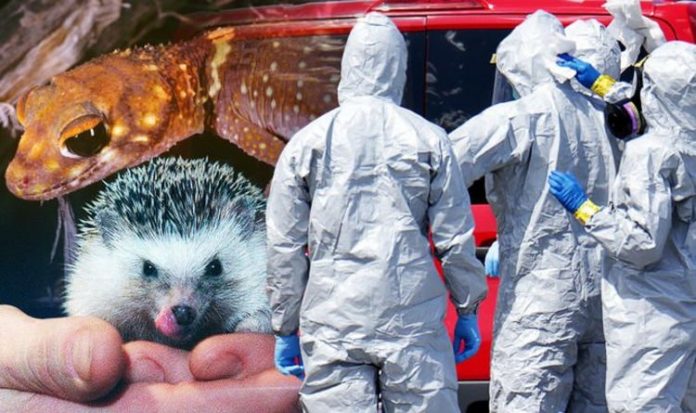Most were destined for the pet trade, and came from 90 countries including disease hotspots such as Singapore, Ghana, Indonesia, El Salvador, Cameroon, Nicaragua and Madagascar, says the charity World Animal Protection. COVID has been traced to a wildlife market in Wuhan, China, where the virus is thought to have jumped to humans from bats, possibly via pangolins.
Seventy percent of all diseases that leap from animals to humans are thought to emerge from wild animals. Among the “zoonotic” diseases that have crossed to humans are Sars, Ebola and Aids.
World Animal Protection described the wildlife trade as “a lethal hotbed of disease”.
The stress of captivity and transport weakens the immune systems, bringing animals into unnatural proximity with others and people, often in unsanitary conditions.
Peter Kemple Hardy, the group’s wildlife campaign manager, said: “This evidence shows that the legal wildlife trade into the UK is causing suffering to millions of animals and risking another public health crisis.
“We must not overlook the dangers this poses. Harmful and deadly pathogens can be transmitted to humans regardless of a wild animal’s legal status. In a post-COVID world, we should demand nothing less than a global and permanent ban on the commercial wildlife trade to protect wild animals, human health and the planet.”
The group used Freedom of Information requests to discover that 2.4 million amphibians, 578,772 reptiles, 150,638 mammals, and 99,111 birds were imported for commercial purposes including the exotic pet trade from 2014 to 2018.
Eighty-one bats, mainly from Madagascar, came, even though this family of animals has been linked to zoonotic diseases.
The group said: “Reptiles imported from tropical countries have a high possibility of carrying potentially dangerous pathogens.”
These include Q fever, lyme disease and salmonella.
Imported animals can also pose a threat to native wildlife.
In 2006 chytridiomycosis, which has caused the decline or extinction of 501 amphibian species, was found in escaped bullfrogs breeding in the UK.
Early on in the pandemic Dr Christian Walzer, of New York’s Wildlife Conservation Society, described wildlife markets as vast and industrialised “cauldrons of contagion”.
He added: “One could not design better conditions for the emergence of new diseases.”
The Department for Environment, Food and Rural Affairs said anyone in the business of selling pets must have a valid licence and meet statutory minimum welfare standards, which include preventing the spread of disease.
It added: “We remain fully committed to ensuring that any trade in wildlife is safe, sustainable, legal, and adheres to high standards of welfare.”
In addition, defences are being boosted by a £1.4billion investment in the Animal and Plant Health Agency.







